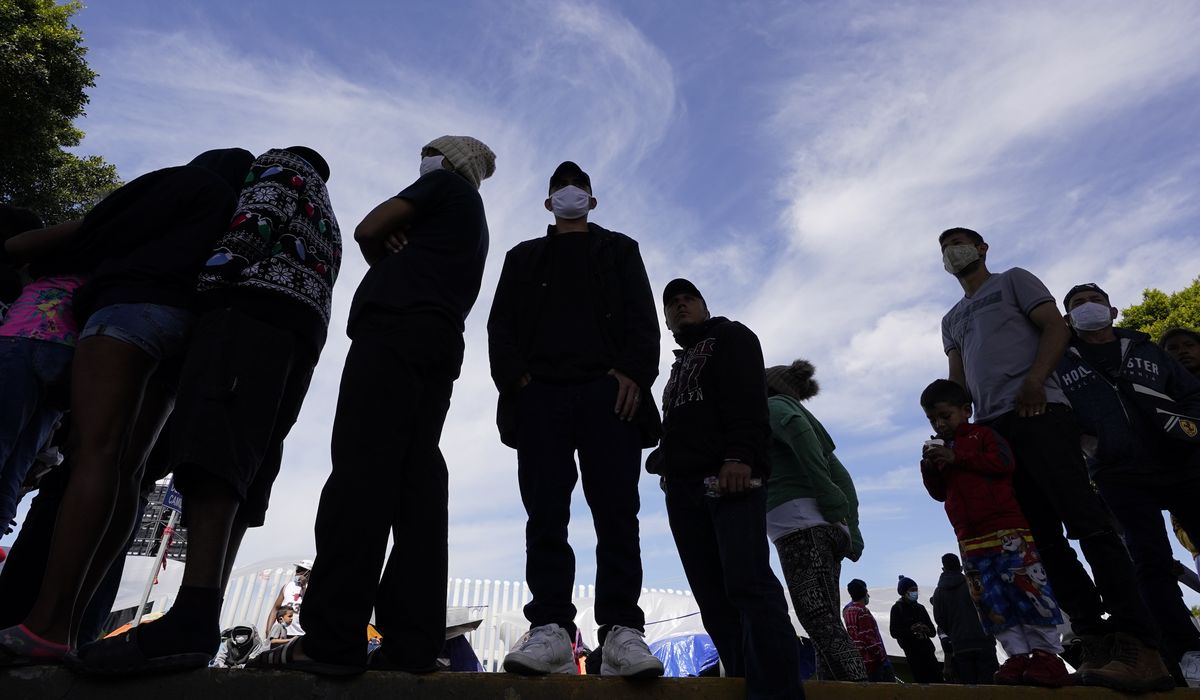
Migrants from Central America are rushing to the U.S. illegally not because of violence or natural disasters in their home countries but because of jobs, a major new study found, challenging claims that they are asylum-seekers fleeing persecution.
The study also calculated that migrants from the emigration hubs of El Salvador, Honduras and Guatemala pay smugglers $1.7 billion a year to be shepherded into the U.S. illegally.
And a staggering 43% of Central Americans have a desire to leave their home countries, up from just 8% a couple of years ago. But only about 3% were making concrete plans.
Still, nearly 30% of households in the three key countries reported getting money sent back home from a household member working in another country, according to the report, a joint effort by the Migration Policy Institute, the Massachusetts Institute of Technology and the World Food Programme.
The analysts conducted a 5,000 in-person survey in the spring and ran an online survey with more than 6,000 responses, building a broad picture of the factors pushing people to leave. They concluded that while violence and insecurity are “longstanding triggers” for migration, most people cited economic reasons for wanting to leave.
“Low wages, unemployment and insufficient income to cover basic necessities directly affected people’s livelihoods and contributed significantly to the desire to emigrate,” the analysts said.
The report challenges the vision of the Biden administration, which argues violence and insecurity are pushing folks to leave their homes and head north and characterizes many of the migrants as asylum-seekers.
Vice President Kamala Harris, tapped by President Biden to get to the bottom of the “root causes” of migration, released a report in July blaming a variety of things such as the coronavirus pandemic and climate change for this year’s migrant surge, on top of the usual factors of violence, food insecurity and poverty.
Ms. Harris‘ strategy called for more international investment to try to boost local economies, as well as efforts to combat corruption, promote human rights and try to reduce violence.
“The COVID-19 pandemic and extreme weather conditions have indeed exacerbated the root causes of migration — which include corruption, violence, trafficking and poverty,” Ms. Harris wrote in her report.
Her office didn’t respond to a request for comment on the report.
As written, U.S. law requires asylum-seekers to be fleeing government persecution. General levels of violence or rough economic conditions are not supposed to be sufficient.
But the U.S. system is generous in allowing claims to be filed, with asylum-seekers usually released from custody and issued work permits while they await decisions in their cases. That chance to gain a foothold — and a job — in the U.S. serves as an incentive for many to make the journey.
That’s particularly true for Central Americans, and particularly those from the Northern Triangle who have played an increasingly prominent role in the story of illegal immigration to the U.S. over the last decade. Where Mexicans once dominated, in four of the last five years, the Northern Triangle countries combined to send more people.
In fiscal 2021, which ended Sept. 30, Customs and Border Protection reported 655,594 encounters along the southern border with Mexicans, compared to 701,049 encounters with people from Guatemala, Honduras and El Salvador.
Given higher recidivism rates for Mexicans, the ratio of individual Central Americans is even higher than those numbers suggest.
While Tuesday’s report looks at what is pushing people to leave their homes, those reasons are inextricably linked to factors in the U.S. that draw them here. Research by other experts found Central Americans raise their incomes about 10-fold by coming to the U.S., versus doubling incomes if they move to Mexico.
The new report found about 90% of recent migrants from the Northern Triangle countries headed to the U.S. Spain ranked as the second top destination, at 4%, and Mexico was third at 2%.
Central Americans pay dearly for the trip.
Those who come illegally shell out an average of $7,500 per person, the analysts said. Those who come legally pay about $4,500. Coming as part of a mass caravan was the cheapest at $2,900, the report said.
Those making the trip often report going deeply into debt, either to family members or smuggling organizations, to finance their journey, then spend their first months or years in the U.S. trying to work it off.
Annual average incomes in the Northern Triangle countries range from about $2,500 to $4,500.
Ironically, if wages in those countries were to rise, it could spur even more people to make the trip north. Tuesday’s report found that lack of money was the most frequently cited impediment would-be migrants cited for why they haven’t attempted the journey.
At the same time, the home countries — and families of migrants — have become dependent on the money being sent back.
The average Guatemalan household in which someone had migrated was receiving $350 a month in remittances. For Hondurans, it amounted to $170, and Salvadoran homes saw $150. Those remittances accounted for nearly a quarter of El Salvador‘s total gross domestic product in 2020.
About a quarter of Northern Triangle households reported that someone in their home attempted to migrate over the past five years. Nearly a quarter of those have been deported back home, and another 9% came back voluntarily.
When asked the motivations for leaving, economics dominated, with 75% of Salvadorans, 89% of Hondurans and 91% of Guatemalans citing that as a factor.
Climate and the environment — a major explanation Ms. Harris has cited — was a reason for 3% of migrants.
Insecurity or violence were factors for 8%, which was the same rate as those seeking to reunite with family members already in their destination countries. But the three countries were not all the same. Salvadorans were far more likely to cite violence or family reasons for making the trip.








